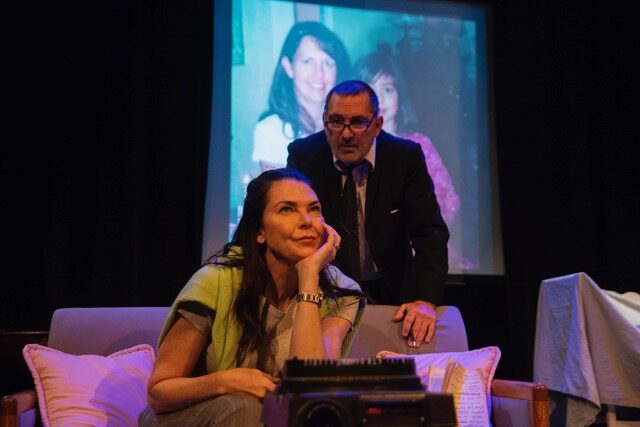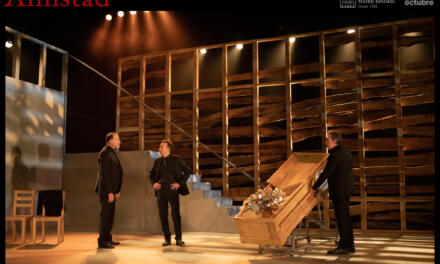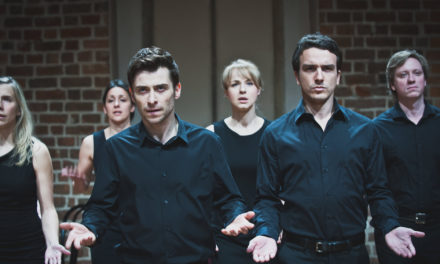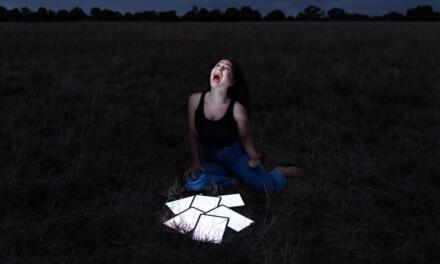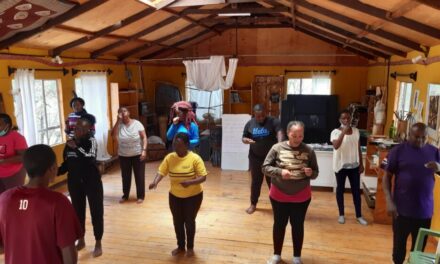Peggy’s Song, the final production of Theatre Kingston’s 2019-20 season, provides a light-hearted respite from the serious dramas shown in the fall (the socially conscious–driven Welcome to my Underworld and Samuel Beckett’s Happy Days). To be sure, there is a serious story undergirding this play by long-time writer Jim Garrard, directed by Jacob James, making it fitting with the theme of this year’s season. Yet seemed to be a less ceremonious and more relaxed event at the same time, compared to the two previous productions. I suspect that this has to do with the play’s equal blend of comedy with tragedy, which resulted in many laughs being periodically elicited from the audience.
Peggy’s Song initially starts as a domestic mystery, with the titular character (Lisa Howard) making a disconcerting discovery about the circumstances of her husband’s untimely death. Killed in a plane crash, it is revealed that Peggy’s husband, Howard, was accompanied by a teenage girl (also deceased). Suspecting the worst possibility of an illicit affair at first, she hires a private detective (Conrad Dunn) to help her comb through Howard’s personal and financial records. As the search progresses, however, Peggy soon learns that the relationship between Howard and the girl was not as it seems – this fact, in turn, reveals how her husband’s familial life was much more complicated. Questions about the very foundations of one’s marriage and the secrets their spouse can harbor emerge at the fore of the play grippingly, as a consequence.
Although Garrard’s play is well-positioned to explore these questions and the fraught emotions that come with it, the relatively short run time inhibits meaningful expansion into Peggy’s journey. The second act, lasting only about half an hour, seems to simply reinforce the unknowability of a person’s true character (even someone as intimate as a spouse) and subsequently provide the necessary revelation for proper closure. The company’s webpage for the play states that Garrard re-worked the script specifically for this production in Kingston, which makes me wonder if there was more previously.
In this current form, however, the performances of the actors duly provide weight to the script. Lisa Howard’s afflicted Peggy comes to life as the show progresses, presenting a powerful rendering of a wife having to grapple with tragedy amidst discovering uncomfortable truths about her spouse. Her emotion especially shines through when her character reminisces about when she and Howard first met in high school. Conrad Dunn provides a necessary comic balance to the otherwise somber atmosphere, as the matter-of-fact detective. His unfazed attitude towards the doubts that arise about Howard’s character stand in stark contrast to the personal upheaval Peggy experiences.
Various technical aspects also enhance the narrative progression of the play. The suspenseful music played during scene transitions throughout the first act contributes to the mystery atmosphere; in addition, the catalog of 80s tunes heard before the show and at intermission gives an ample sense of the play’s time period. Peggy’s bright red dress in the second act nicely emphasizes her coming closer to an acceptance of her husband’s passing in a visual manner (in contrast to the plain outfits worn in the first one). The projected slides at the back of the stage, provided by David Hlynsky, showing past memories is another nice touch.
Peggy’s Song is overall an emotionally effective piece which goes into the heart of a personal tragedy, though the worthwhile questions it raises concerning our knowledge of those closest to us and how one can cope in the face of such duplicity deserve more attention.
Peggy’s Song continues until February 9 at the Grand Theatre in Kingston. For information and tickets, see https://www.theatrekingston.com/peggys-song.html
This article was originally posted in Capital Critics Circle on 26 January 2020 and has been reposted with permission. To read the original article, click here.
This post was written by the author in their personal capacity.The opinions expressed in this article are the author’s own and do not reflect the view of The Theatre Times, their staff or collaborators.
This post was written by Natasha Lomonossoff.
The views expressed here belong to the author and do not necessarily reflect our views and opinions.

